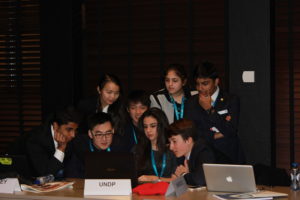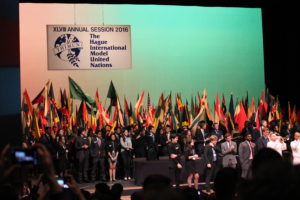Starting as a local conference in 1968, The Hague International Model United Nations (THIMUN) Foundation has grown immensely; four yearly THIMUN conferences are held, and recognized, worldwide. The THIMUN Foundation has also developed a Model United Nations Procedure, known as THIMUN Procedure, that is used worldwide as one of the few standard MUN procedures.
Attending a THIMUN Conference
The THIMUN Conferences are THIMUN The Hague (January 29- February 3, 2017), THIMUN Singapore (November 21-25, 2016), THIMUN Qatar (January 24-26, 2016), and THIMUN Latin America (September 28-October 1, 2016). THIMUN also hosts MINIMUN, held in The Hague, and THIMUN Online-Model United Nations (O-MUN).
You can also attend THIMUN-affiliated conferences, which are held worldwide. To find a THIMUN-affiliated conference near you, click here.
Participants at a THIMUN Conference
Secretariat
With the guidance and support of the THIMUN Board of Directors, a select few of international applicants are selected to serve as Secretariat members at every THIMUN Conference. Each THIMUN Conference has regulations as to who can apply for what position. Members of the Secretariat include the Secretary General, Deputy Secretaries Generals, and the President of the General Assembly. The main role of the Secretariat is to overlook conference logistics and guide the Student Officers.
Student Officers
Student Officers are selected from an international pool of applicants to serve as directors of committees. Students chosen are experienced in leading a committee and are allocated a position to serve in one of the conference committees. Every THIMUN Conference requires skilled and experienced Student Officers to guarantee all committees run smoothly.
Delegates
The majority of participants attending THIMUN Conferences are delegates. As THIMUN Conferences are one of the largest and more notable conferences in each region, delegates from all over the world attend these conferences to learn more about global issues, diplomacy, THIMUN Procedure, and the functions of the United Nations.
Lobbying
In THIMUN Conferences, for most committees, lobbying occurs for the first one to two days of the conference. Delegates are given an opportunity to effectively work together among other delegates in their committees to come up with clauses to resolutions that will eventually be vetted and debated for the following days of the conference. Prior to lobbying, delegates separate themselves to form a lobbying group within the committee. Lobbying is an especially important part of the THIMUN experience, as delegates are able to get to know other delegates, while also collaborate and learn more about other policies and how it could properly be applied to producing a resolution. By the end of lobbying, the goal is to produce a substantial amount of well-written resolutions on all issues which will be debated during the conference.

Committee & Committee Topics
THIMUN offers a wide range of committees for all participants, closely mirroring the committees of the United Nations. The number of committee topics in each THIMUN committee would usually range from 4 to 6 topics depending on the size of the committee. The chairs of the committees divide the research reports for all topics, and as a result, all committee topics have a research report written by a committee chair who will specialize in that topic and guide delegates on questions before, and throughout the conference.
The International Court of Justice (ICJ) is also offered as a THIMUN committee. The ICJ is a specialized committee that includes two groups, which include two participants in each group, serving as Advocates against opposing bodies. The ICJ is the only committee that includes a “winning” party by the end of the conference. Vaishnavi Vijayan, the President of the ICJ for THIMUN Singapore 2016 states the following about ICJ:
“ICJ Is a great experience to understand court proceedings and get more opportunities to speak because of the smaller setting and offers a variety of different positions depending on how much you want to be involved. It’s great to try it at least once in your MUN experience!”
General Assembly Plenary Session
A unique part of the THIMUN experience is attending the General Assembly plenary. The General Assembly plenary brings all GA sub-committees of the conference into the main auditorium of the venue to collectively debate. Robin De Zeuuw, the President of the General Assembly of THIMUN Hague 2016, chaired THIMUN Hague’s General Assembly Plenary, and talks about his personal experience;” he states.
“Being a part of the THIMUN 2016 Secretariat as the President of the General Assembly was by far one of the best experiences of my life. One of the biggest moments at THIMUN is the General Assembly Plenary, where approximately 1,500 delegates and guests come together to either debate or observe four resolutions that had been passed within committees beforehand. As the PGA it was my responsibility to chair this notoriously rowdy room with people coming from all corners of the world. I hope to attend another plenary next year as a guest wherein I AM positive that the team will be able to organize itself so efficiently once again.”

Best Delegate has and continues, to attend THIMUN Conferences to teach Director Institutes at THIMUN Hague, Qatar, and Singapore. To learn more about Best Delegate’s involvement during THIMUN Conferences, click here to find out!

